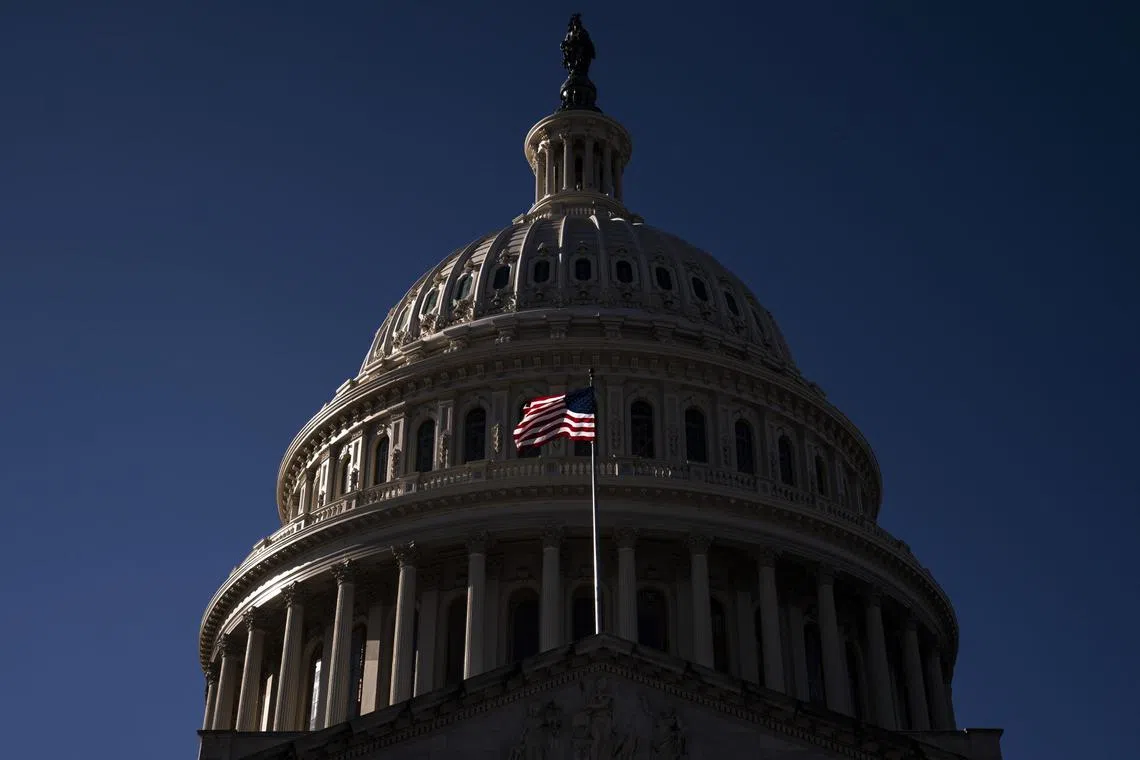Campaign to renew US spy powers faces bitter battle in Congress
Sign up now: Get ST's newsletters delivered to your inbox

Lawmakers on both sides of the aisle are rallying to demand reforms given startling revelations about the programme’s use and abuse.
PHOTO: BLOOMBERG
Follow topic:
WASHINGTON - The US intelligence community faces a hard battle to renew foreign surveillance powers that have enabled authorities to repeatedly access private information about Americans despite constitutional protections.
The Biden administration wants to renew Section 702 of the Foreign Intelligence Surveillance Act (FISA), a warrantless wiretapping programme introduced in 2008, which was last renewed in 2018 and is due to expire at the end of the year.
“Without Section 702, we will lose critical insights into the most significant threats to our nation,” said General Paul Nakasone, director of the National Security Agency, in a speech launching the Biden administration’s defence of what he described as “irreplaceable insights” on Thursday.
US espionage insights gleaned from Section 702 have prevented weapon components from reaching adversaries, thwarted threats to US troops, and disrupted cyber and terrorist attacks, including a 2009 foiled plot against the Manhattan subway, Gen Nakasone said.
“We have saved lives because of 702,” he said.
But lawmakers on both sides of the aisle are rallying to demand reforms given startling revelations about the programme’s use and abuse.
The pushback is fuelled in part by Republican zeal to take on the federal government following the party’s midterm victory in the House, which already includes a deluge of complaints against the FBI on other issues.
Representative Jim Jordan, a Republican from Ohio, has vowed to make changes to the FISA process, telling Fox News last year that Congress “should not even reauthorise FISA”.
A Senate aide told Bloomberg News that extending 702 without changes is going to be a “non-starter” in the current Congress, adding that bipartisan members in both chambers have made clear that surveillance programmes such as section 702 of FISA need significant reforms in order to protect Americans’ rights.
The aide requested anonymity to discuss sensitive legislative strategy.
While the programme is intended to collect communications of hundreds of thousands of non-Americans abroad for foreign intelligence purposes, it has also incidentally swept up communications with or about US persons and companies.
US intelligence agencies can then search the data trove by such things as Americans’ names, telephone numbers and e-mail addresses, in what are known as “US person queries”.
Detractors characterise this manner of prying on Americans’ details - and potentially their communications - as a “back-door search.”
“It is a bait and switch that drives a hole through the Fourth Amendment,” said Ms Elizabeth Goitein, senior director of the Liberty and National Security Programme at the Brennan Centre for Justice.
Ms Goitein is briefing members of Congress from both parties, she said, adding that the Biden administration was “well aware” it wouldn’t get a straight reauthorisation. She predicted the administration would downplay violations in a bid to get it reauthorised.
“If I want to tap American phone calls I should have to get a warrant; 702 should not be used as a runaround,” she said, noting a reform initiative that failed during the 2018 renewal process.
The FISA court, which authorises electronic surveillance to obtain foreign intelligence information and can approve wiretapping requests, has found “apparent widespread violations” of the rules, including “pervasive” failure to search the data in a compliant manner.
The US intelligence community last year revealed the FBI turned to the communications trove to make searches about Americans as many as 3.4 million times in 2021, up from 1.3 million in 2020.
Mr Mike Herrington, senior operations adviser at the FBI, on Thursday defended such searches as a means to prevent crime including cyber attacks, but he also described the FBI’s high rate of non-compliance with privacy rules as “unacceptable”.
FBI Director Christopher Wray is “hellbent on doing whatever it takes to fix our compliance”, he said, adding that additional steps were possible in the wake of two years of reforms.
Mr Tom Bossert, former homeland security adviser to President Donald Trump who helped secure the renewal of FISA in 2018, told Bloomberg News he has directly advised senior US officials and lawmakers from both parties to strategise a push for straight reauthorisation, predicting a “bitter” fight ahead.
He argued that administrative abuses of Section 702 are far less significant than its usefulness for national security, but acknowledged the administration might ultimately have to compromise to push it through.
“My fear is that we’re far enough removed in time from 9/11 that the electorate and many of their elected officials might forget or not understand the threat to our country,” he told Bloomberg News. BLOOMBERG

